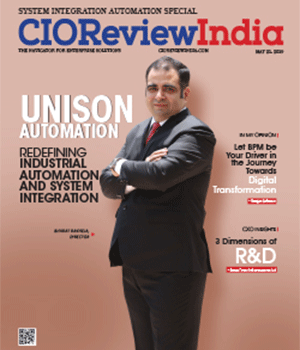
Can AI Speed Up the Supply Chain Process?
Nishith Rastogi, Founder & CEO, Locus.sh | Friday, 30 June 2017, 12:49 IST
 Like many other industries, the logistics sector is currently confronting enormous change management, and like all change, this brings both risk and opportunity. New technology, new market entrants, new customer expectations, and new business models. There are many ways the sector could develop to meet these challenges, some evolutionary, others more revolutionary.
Like many other industries, the logistics sector is currently confronting enormous change management, and like all change, this brings both risk and opportunity. New technology, new market entrants, new customer expectations, and new business models. There are many ways the sector could develop to meet these challenges, some evolutionary, others more revolutionary.
One of the long held aims of the industry has been to reduce the number of freight vehicles on the road. As such a significant part of the GDP in India, the prospect of being able to remove 30-40 per cent of freight vehicles from the roads has massive environmental and economic implications for all of us.
A perfect blend of art and science, logistics forms the humanities of the business world. And to have a grasp of what that means, one has to go beyond defining it as the shortest path between two points. Managing available resources effectively, minimal transportation expenditure and overall smooth operation is the goal to be achieved, unfailingly, every single time. It can get pretty mind-boggling, as poorly organized logistical service providers often complain about idle vehicles at times, and an unprecedentedly busy fleet at other instances. And the business, of dispatching the desired order, to the customer, within an acceptable/promised period can get unbelievably tricky, unless your software is sufficiently advanced to support situational optimization. And that’s not where the story ends. One can always expect last moment changes in deployment of orders, modifications in quantity, availability of fleet and unexpected flux of traffic.
Let’s look at it this way – there are n! ways in which one can deliver n items. That is to say, to deliver two items, 1x2 (so, two) combinations are possible, for three, 1x2x3 (so, six) combinations, and for completing just six purchase orders, an atrocious 720 ways. And that, as one can see, is quite beyond human capacity to manage productively, without computational intervention. In fact, it gets so mathematical, that we can already see you cringe in anticipation of complex formulae hauled at you. Add it all up and the sector is under acute and growing pressure to deliver a better service at an ever lower cost.
Artificial Intelligence may have seen its share of controversy in recent times, but there is no denying that its advance algorithms have transformed the analytical abilities of logistics operations. Businesses are intercepting copious amounts of data with the end goal of giving their customers more of what they want, when and where they want it, with utmost efficiency. Now with the ‘smart’ attribute, AI technologies use what it ‘learns’ on one task or product and transfers that knowledge when it recognizes its need for similar tasks or products. Even the most skilled human mind does not hold a candle to the speed and conclusiveness that AI brings to the logistics table.
How Do We Deliver Services On Demand?
Changing consumer behavior and the desire for personalization are enforcing the employment of AI in the on-demand services sector, since the processes involved there exceed the bandwidth of even a skilled human. On-demand delivery enables consumers to have their purchases delivered where and when they need them by using flexible courier services. The system, powered by machine learning, automatically assigns delivery jobs to drivers, reducing the need for a human dispatcher.
Where Should My Trucks Be?
Delivery route planning algorithms can chart the best possible route to deliver an order and allow a field executive to cover the maximum number of points in the shortest time possible. With the faculty of both intra-city and inter-city route planning, Route Optimization is technology’s answer to the famous Traveling Salesman Problem.
Can We Expect the Unexpected?
Managing disruptions is an important business task that can be improved with AI. Predicting disruptions and training AI to learn from contingency plans developed by humans enables automated corrective action in the future. AI can leverage data platforms to process terabytes of data and create datasets to determine patterns and anomalies. These patterns are governed by predictive analysis, which can forecast variables like ETAs, delivery zones, and even the distance a package has to travel before it reaches the end customer.
How and When to Purchase?
AI assists in procurement by generating real-time visibility of the spend data and helps drive cost reduction and compliance agenda, in the process.
What is the Future of Transportation?
Driverless vehicles, alone have the potential to completely change the way we transport products, and they’re closer than we think. Towards the end of last year, in the US, an experimental driverless truck delivered 50,000 beer cans, covering around 200 kilometers, going up to 80 km/h. The testing served as a wake-up call for the logistics industry that employs millions of truck drivers. AI is shaping up to take over the roads as well, potentially leading to full automation of truck fleets.
In today’s dynamic world, AI embedded supply chains offer a competitive advantage. AI armed with predictive analytics can analyze massive amounts of data generated by the supply chains and help organizations move to a more proactive form of supply chain management. Thus, in this digital age where the mantra is “evolve or be disrupted”, companies are leveraging AI to reinvent themselves and scale their businesses quickly.
CIO Viewpoint
By Steve Brunker, CIO, LSI Industries
By Joel Austin, CIO, Oncor Electric Delivery
How Is IoT Emerging as Next Technology Mega...
By Prashanta Ghoshal, Director - IT Solutions, Geometric Ltd.
CXO Insights
Addressing the Challenges in Logistics Automation
By Janifha Evangeline
Digitalization - the critical enabler for...
By Rajesh Ramachandran, Global Chief Digital Officer - Process Automation & ABB Ability, ABB
Enterprise-wide Approach Needed for...











